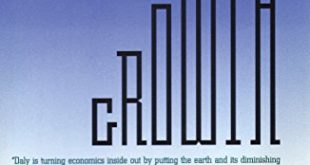Ecological economist Herman Daly has passed away at the age of 84. Together with economists such as Kenneth Boulding and Nicholas Georgescu-Roegen, he was one of the founding fathers of ecological economics. R.I.P.
Read More »Alter Friedhof Prenzlauer Allee
Alter Friedhof Prenzlauer Allee
Read More »On tour (Berlin)
Guest appearance in Berlin. Regular blogging to be resumed next week.
Read More »Leontief and the sorry state of economics
Leontief and the sorry state of economics Page after page of professional economic journals are filled with mathematical formulas leading the reader from sets of more or less plausible but entirely arbitrary assumptions to precisely stated but irrelevant theoretical conclusions … Year after year economic theorists continue to produce scores of mathematical models and to explore in great detail their formal properties; and the econometricians fit algebraic...
Read More »Macroeconomic aspirations
Some economists seem to be überjoyed by the fact that they are using the same ‘language’ as real business cycles macroeconomists and that they therefore somehow can learn something from them. James Tobin obviously did not find any need to speak the RBC ‘language’: They try to explain business cycles solely as problems of information, such as asymmetries and imperfections in the information agents have. Those assumptions are just as arbitrary as the institutional rigidities and...
Read More »Schubert — Quintet, Op. post. 163, D. 956: II. Adagio
Schubert — Quintet, Op. post. 163, D. 956: II. Adagio .[embedded content]
Read More »Sveriges riksdag år 2022
Sveriges riksdag år 2022 I sanning en vacker syn — klimatförnekaren Elsa Widding (SD) talar i Sveriges riksdag under det att evolutionsförnekaren och vice talman Julia Kronlid (SD) andäktigt lyssnar. Herre du min milde! Och detta grodors plums och ankors plask ska man behöva åse och höra år 2022. Man tager sig för pannan.
Read More »Ett jävlikt val av skolminister …
Ett jävlikt val av skolminister …
Read More »The Nobel prize in economics — awarding popular misconceptions
The Nobel prize in economics — awarding popular misconceptions This year’s Sveriges Riksbank Prize in Economic Sciences in Memory of Alfred Nobel honours Ben Bernanke, Douglas Diamond and Philip Dybvig. In the view of the Royal Swedish Academy of Sciences, the laureates ‘have significantly improved our understanding of the role of banks in the economy’. But what is the role of banks in the economy? The academy describes it this way: ‘To understand why a...
Read More »55 Tufton Street and the people who crashed the British economy
55 Tufton Street and the people who crashed the British economy .[embedded content]
Read More » Lars P. Syll
Lars P. Syll







